Let’s talk about David Lean’s landmark epic Lawrence Of Arabia.
By now, the film’s reputation is well established. Considered by many to be one of the greatest films of all time (it certainly ranks high on my personal list), in 1962 Lawrence Of Arabia garnered seven Academy Awards, including Best Picture. Peter O’Toole’s tortured performance is the stuff of legend, and its on-screen vistas have inspired filmmakers from Stephen Spielberg to Martin Scorsese to Peter Jackson. Even people who have never seen it at least know of its lofty reputation.
But some classic films of yesteryear have a way of surviving on praise rather than lasting merit; people cite a film for greatness simply because you’re supposed to, others repeat what they’ve heard, and before long the greatness is uncritically accepted as common wisdom. Your professor in film school called it an all-time great, and you told your friends the same, and so on, until it is repeated so often that no one dares question the notion that said film is anything but impeccable.
So does Lawrence Of Arabia live up to the crushing burden of 55 years of enormous praise?
Yes. Yes, it does.
Lawrence Of Arabia tells the story of real life British military man T.E. Lawrence, who served in the Arabian desert during World War I. His book, The Seven Pillars Of Wisdom, tells of his time in the desert, a time during which he led legendary attacks on Aqaba and Damascus, and gathered together a small army of ragtag Arabian soldiers to wage a guerrilla war against the Turkish forces. It was the stuff of legend even during his lifetime. The film attempts to tackle that book and Lawrence’s story. And there is a lot to tackle.
This is a big, big movie. It has to be, because one of its main characters – maybe the main character – is not so much Lawrence himself, but is instead the sprawling Arabian desert. It is a realm of sand sculpted by thousands of years of wind and desolation and war. Empty, beautiful, dangerous, endless, all of it is captured lovingly in what might be the most gorgeous photography ever to grace the big screen.
These things – war and desolation – sculpted not only the desert, but this beloved film. It is war and desolation, as experienced through the eyes of Lawrence, that serve as the driving force here, pushed onto Lawrence by the desert’s oppressive weight and his own internal demons. While there are gunshots and expansive battles, with World War I serving as the backdrop for this story of self-discovery and self-destruction, this is not a war movie. The real conflict is not the Great War, but Lawrence’s internal conflict; his struggles to find who he is and why he is compelled by the untamed emptiness that is the desert and its people. Like the desert itself – gigantic and empty, alluringly beautiful and savagely dangerous – Lawrence is a startling contradiction. He is surrounded by men who would follow him to death, but he is utterly alone in the world. He wins battle after battle against a superior army, but is a poor military man. He finds violence abhorrent but turns against a small group of weaker enemy forces in a savage and bloody attack of vengeance. He is a ruthless man of war, beloved by the rough and tireless factions of the desert, but barely hides his almost feminine flamboyance. The truth about Lawrence is that there is no truth about Lawrence.
All of these layered aspects of Lawrence’s personality are masterfully brought to the screen by Peter O’Toole in what is one of the great performances ever captured on film. From his awkward, timid beginnings in a British military installation, to his first tentative steps into the gaping maw of a landscape the likes of which he (and the viewer) have never before seen, to his first meetings with the seeming alien (to him) cultures of that same desert, and finally to the growing messianic megalomania that eventually leaves even Lawrence unsure of who and what he is, O’Toole brings the character to life with an intensity that almost hurts to witness. He grimaces. His eyes burn. A gesture or glance. A fire gleaming from within. The layers seem to be endless; the contradictions piled high. On the first viewing it is an impressive performance. By the 10th, you’re starting to wonder when you’ll stop discovering new aspects of the character. By the 20th, you realize you probably never will.
Of course, O’Toole’s tortured performance would just be aimless scenery chewing if not for the masterfully focused direction of David Lean, also known for epics like The Bridge on the River Kwai and Doctor Zhivago. This is a director who got his reputation for being the king of epic films the old fashioned way. He earned it.
Lean’s big epics are not epics merely because they are long, either. After all, it’s easy to just cram your movie full of footage and call it an “epic” just because it passes the three-hour mark. That’s not the case here.
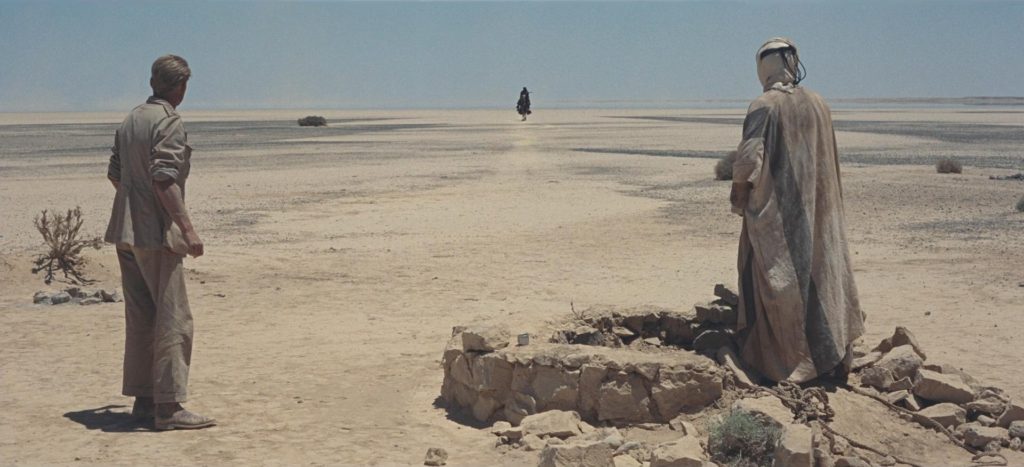
Despite clocking in at just under four hours (228 minutes total with the opening overture and intermission), Lawrence Of Arabia seems to glide by effortlessly. Lean knows when to linger in a scene and when to push forward with character moments. And sometimes, when to do both at the same time. This is best displayed by one of the film’s best known moments, the audacious entrance scene of Omar Sharif’s memorable Sherif Ali. Lawrence, at a well in the middle of the desert, is witness as his guide is suddenly shot from a distance. He gazes off into the hazy heat at the horizon, waiting for the shooter to approach. Approach he does, slowly; deliberately; the camera lingering; gazing into the distance, the waves of heat masking the tiny black dot in the distance. But the dot grows. And grows. And grows. And from the sandy waste emerges the brilliant Sharif on horseback. It’s a sustained, deliberate shot no director should be able to get away with … but Lean does.
There are many such moments, scenes when Lean simply luxuriates in the setting, Maurice Jarre’s bombastic score swelling as the amazing scenery goes by. In a film with this kind of scope, a lesser director could easily allow the cast to be swallowed up by the scale of the thing. Not Lean. The sheer spectacle of the imagery can be overwhelming, yet it is always tempered with the kind of small character moments that draw you deeper into who these people are and why they do what they do. All of the performances, from O’Toole and Sharif to great turns by Alec Guinness, Claude Rains, Anthony Quinn and others, are given a degree of rich clarity big action movies simply don’t provide.
And that’s because despite the sprawling setting and the triumphantly huge battles, Lawrence Of Arabia isn’t an action movie. Make no mistake, the battle sequences are stunning – the taking of Aqaba is presented in a remarkably bold sweep of the camera populated by hundreds of riders that simply takes your breath away, and that’s only one of many such highlights – but this isn’t a film about battles between armies. At its core, and a big reason why is remains so well respected, is that it is a film about the battles men have inside themselves. Sharif, torn between the ways of his people and the lure of a more modern world. Quinn’s Auda abu Tayi between his unspoken respect for Lawrence and his desire to make a buck. And Lawrence himself, pulled this way and that by his own insecurities and arrogances.
Lawrence Of Arabia is not a film that is seen, it is a film that is experienced. The delicious 70mm photography is like a lush painting come to life. The conflicts of the characters, both internal and external, are compelling in their richly human drama. And the many cinematic flourishes of the masterful David Lean make all four hours a delight.
Yes, it’s a long film. And yes, the plot meanders into a second act that doesn’t quite live up to the first.
But these are terribly small gripes. Without question, Lawrence Of Arabia has earned its reputation as one of the great works of cinema, a stunningly huge, audaciously ambitious epic that manages to mix equal parts visual splendor and focused character study.
If you have not yet experienced Lawrence Of Arabia, you’re missing out on one of the most compelling epics of all time.

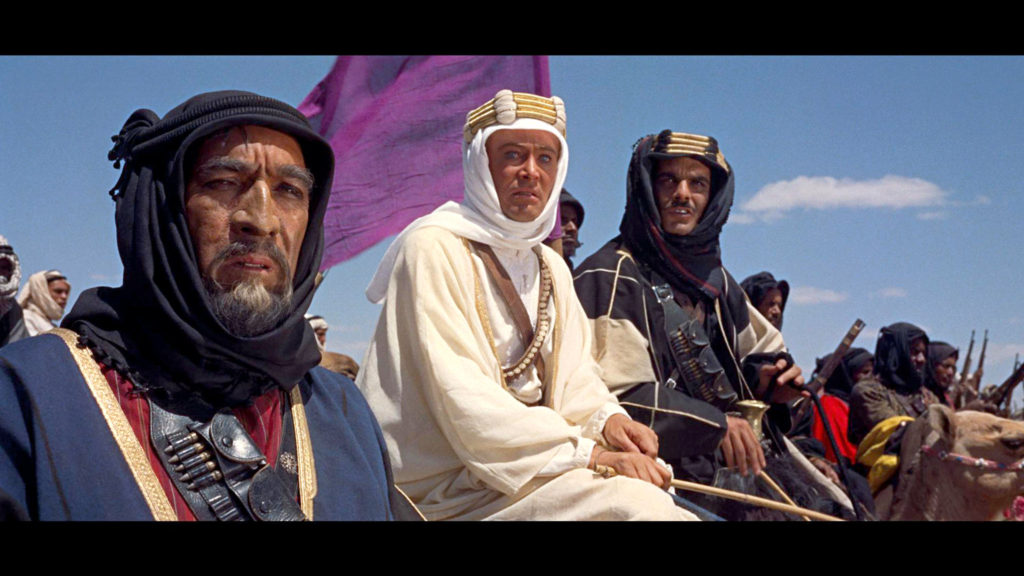
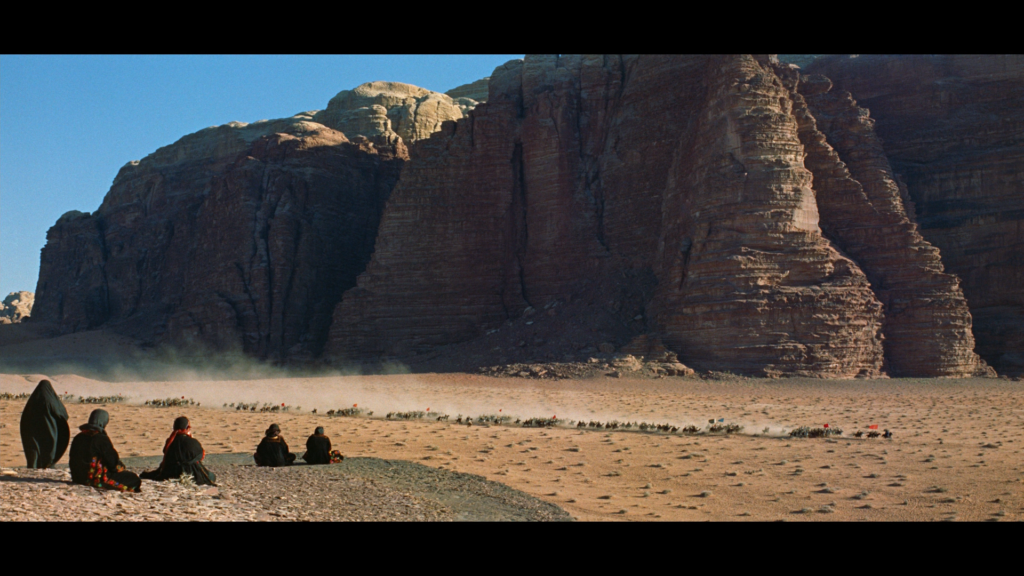
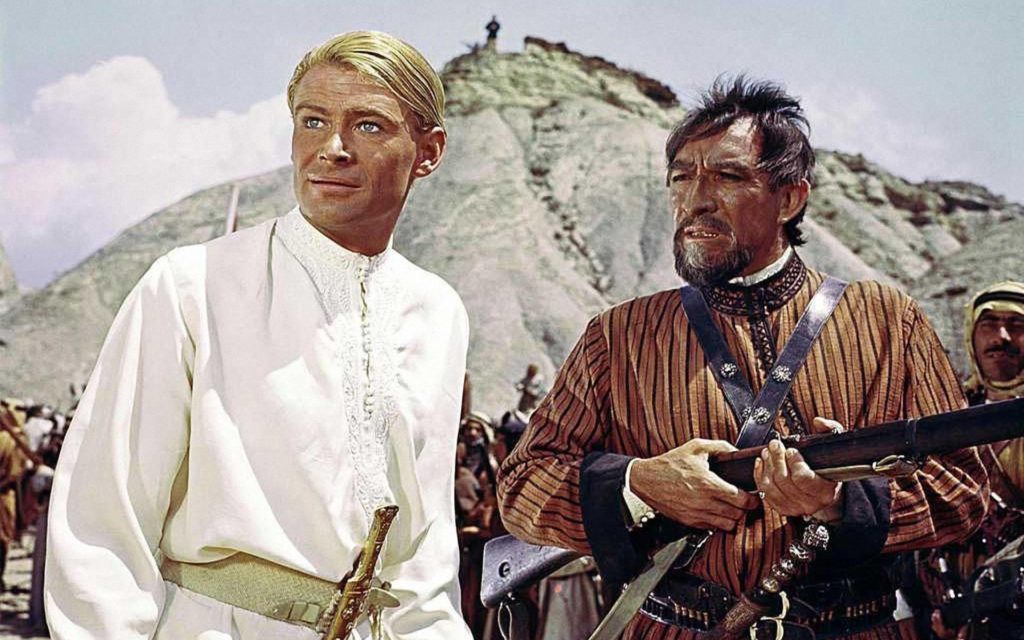
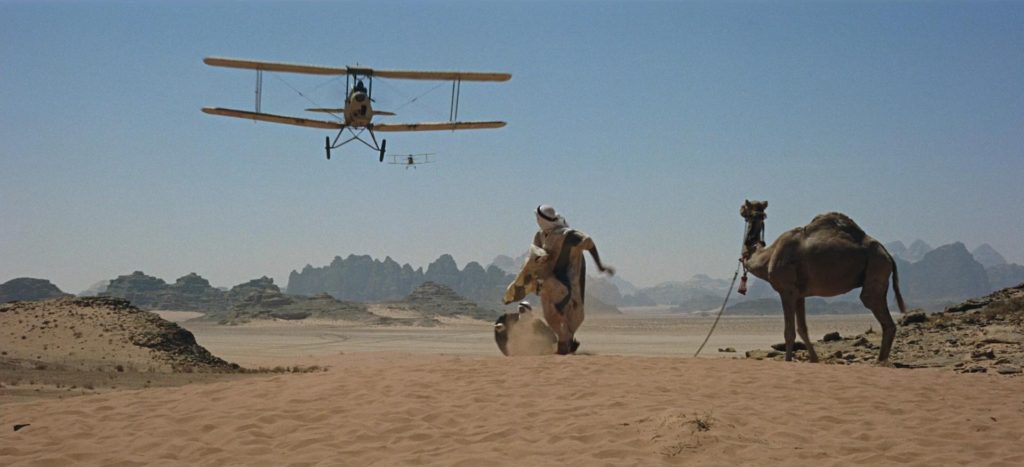
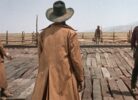
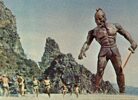




I… I ummm… never saw this movie.
Excellent write up.
Thank you, sir. This is one of this films that has a reputation no film should be able to live up to, yet it does.
Awesome writing. I’ve been itching to watch a flick on the 80 inch screen in my kitchen for a bit now but have been waiting for the right one to inspire me to do it. I think I’ve found it thanks to you. Shamefully I’ve never seen it.
Oh, if ever there was a film to show off a huge set, it’s this one. For the stunning visuals alone it’s a worthwhile watch (all four hours of it). That it also has a strong story with a remarkable character at the center of it only makes it all the better. The film’s only real stain is casting an old British dude and old Mexican dude to play Arabian men (Alec Guinness and Anthony Quinn), but it also launched Omar Sharif into international stardom, and he’s incredible, so there’s that. ‘Tis good stuff.
Four hours is a bit of a haul to be sitting at the kitchen table. We’ll probably have to split it up
It’s got an intermission, though it’s not evenly divided in two. There are some fairly clear story points that make for good breaks, too. I’ve watched it in segments before.
It’s rare that the Academy gets things right when it comes to awarding Best Picture, but when they do, they usually offset this right by making another wrong. With all due respect to admirers of To Kill a Mockingbird, it’s a travesty that Peter O’Toole (who never won a competitive Oscar) lost this race to Gregory Peck. A similar travesty ocurred a few years ago when Michael Keaton lost to Eddie Redmayne because the latter played a beloved handicapped character.
Peck vs. O’Toole here is a really tough one. Peck’s role is a classic, but I’d go with O’Toole. There is more going on with the character, more layers, more underneath the surface, more for the viewer to suss out on their own based on what O’Toole does. Peck does a great job playing a decent man trying to do the right thing, but it’s not a REMARKABLE performance, IMO. With O’Toole, I realize something new about how Lawrence’s mind works every time I watch it. There is as much happening on his face as there is in the dialogue.
(which addresses both Peck/O’Toole and Redmayne/Keaton)
Pingback: Why Are Marvel’s Blu-Ray Releases So Mediocre? – ERIC SAN JUAN
Pingback: There are 97 Oscar nominations and 17 wins for acting among the Marvel Cinematic Universe (MCU) cast – ERIC SAN JUAN